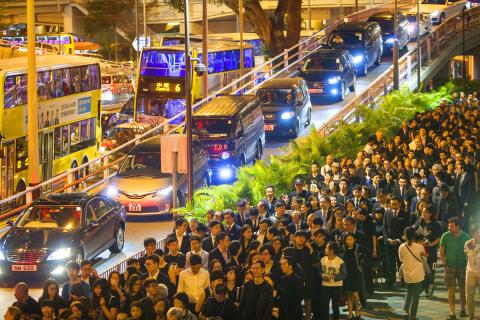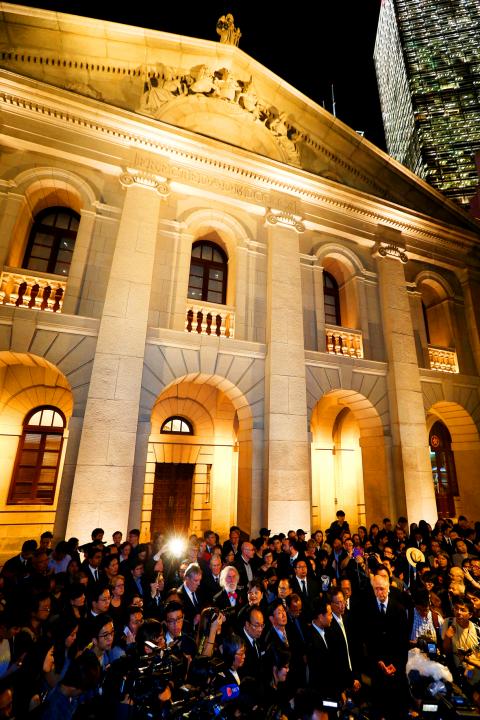Hundreds of Hong Kong lawyers dressed in black yesterday marched through the heart of the territory in silence to condemn a move by China that effectively bars two elected pro-independence lawmakers from taking their seats in the legislature.
Local and foreign lawyers walked from the High Court to the Court of Final Appeal, underscoring growing concern among Hong Kong’s legal elite with how Beijing has handled affairs in the “special administrative region.”
The demonstration follows a decision by China’s National People’s Congress to interpret Hong Kong’s mini-constitution, or Basic Law, to effectively bar the independence lawmakers from taking their oaths of office.

Photo: EPA
“We want to express that interpretation is not the norm of the Hong Kong legal system,” said barrister and Legislator Dennis Kwok (郭榮鏗), who organized the rally. “We will not accept interpretation becoming the norm.”
As the lawyers marched, about a dozen pro-Beijing protesters taunted them, some shouting obscenities through loudspeakers.
One Beijing loyalist held up a placard that read: “Rioters mess up Hong Kong.”

Photo: Reuters
Beijing’s ruling on Monday that oaths for Hong Kong lawmakers must be taken accurately, sincerely and solemnly for them to be valid, just as a local judicial review of the case was under way, rattled many in the legal profession, political circles and beyond.
The High Court is set to decide if pro-independence Youngspiration lawmakers Sixtus “Baggio” Leung (梁頌恆), 30, and Yau Wai-ching (游蕙禎), 25, might be disqualified after they displayed a “Hong Kong is not China” banner during a swearing-in ceremony on Oct. 12 which resulted in their oaths being invalidated.
Hong Kong has thrived as a financial and legal center thanks in part to its independent rule of law, which many inside and outside the territory now see as under threat.
The Hong Kong Bar Association, which represents more than 1,000 barristers, expressed regret over the interpretation, saying it would “do more harm than good” and gave the impression that Beijing was effectively legislating for Hong Kong.
The march was only the fourth such protest by the territory’s lawyers since 1997.
The last march, in June 2014, was in response to a white paper by China’s Cabinet that declared “loving the country” was a basic political requirement for all Hong Kong administrators, including judges and judicial personnel.
Monday’s ruling breaks new ground because it is the first time that Beijing has acted in a pending court case without a request by the Hong Kong government or judiciary, and because it appears to establish a mechanism for authorities to block critics of Chinese Communist Party rule from taking elected office or even getting their names on ballots.
Some academics said the decision went beyond interpreting the charter and amounted to rewriting the local statute governing how officials are to be sworn in.
It requires lawmakers to read their oaths “completely and solemnly,” exactly as written, and orders those who administer oaths to disqualify lawmakers who alter or deliver the words in an “insincere or undignified manner,” barring them from office without another chance to be sworn in.
The decision also says lawmakers will be held liable if they violate their oaths, but it provides no guidance on who has the power to determine whether a lawmaker is in breach or what the punishment should be.
The fear is that this will inject a degree of arbitrariness into a system that is based on rules underpinned by centuries of precedent under British common law.
Additional reporting by NY Times News Service

MAKING WAVES: China’s maritime militia could become a nontraditional threat in war, clogging up shipping lanes to prevent US or Japanese intervention, a report said About 1,900 Chinese ships flying flags of convenience and fishing vessels that participated in China’s military exercises around Taiwan last month and in January last year have been listed for monitoring, Coast Guard Administration (CGA) Deputy Director-General Hsieh Ching-chin (謝慶欽) said yesterday. Following amendments to the Commercial Port Act (商港法) and the Law of Ships (船舶法) last month, the CGA can designate possible berthing areas or deny ports of call for vessels suspected of loitering around areas where undersea cables can be accessed, Oceans Affairs Council Minister Kuan Bi-ling (管碧玲) said. The list of suspected ships, originally 300, had risen to about

DAREDEVIL: Honnold said it had always been a dream of his to climb Taipei 101, while a Netflix producer said the skyscraper was ‘a real icon of this country’ US climber Alex Honnold yesterday took on Taiwan’s tallest building, becoming the first person to scale Taipei 101 without a rope, harness or safety net. Hundreds of spectators gathered at the base of the 101-story skyscraper to watch Honnold, 40, embark on his daredevil feat, which was also broadcast live on Netflix. Dressed in a red T-shirt and yellow custom-made climbing shoes, Honnold swiftly moved up the southeast face of the glass and steel building. At one point, he stepped onto a platform midway up to wave down at fans and onlookers who were taking photos. People watching from inside

Japan’s strategic alliance with the US would collapse if Tokyo were to turn away from a conflict in Taiwan, Japanese Prime Minister Sanae Takaichi said yesterday, but distanced herself from previous comments that suggested a possible military response in such an event. Takaichi expressed her latest views on a nationally broadcast TV program late on Monday, where an opposition party leader criticized her for igniting tensions with China with the earlier remarks. Ties between Japan and China have sunk to the worst level in years after Takaichi said in November that a hypothetical Chinese attack on Taiwan could bring about a Japanese

The WHO ignored early COVID-19 warnings from Taiwan, US Deputy Secretary of Health and Human Services Jim O’Neill said on Friday, as part of justification for Washington withdrawing from the global health body. US Secretary of State Marco Rubio on Thursday said that the US was pulling out of the UN agency, as it failed to fulfill its responsibilities during the COVID-19 pandemic. The WHO “ignored early COVID warnings from Taiwan in 2019 by pretending Taiwan did not exist, O’Neill wrote on X on Friday, Taiwan time. “It ignored rigorous science and promoted lockdowns.” The US will “continue international coordination on infectious